The Role of Culture: A PHIL 1301 Essay on Identity and Society
VerifiedAdded on 2023/01/19
|5
|1277
|69
Essay
AI Summary
This essay, submitted to Desklib, examines the significant role of culture in shaping an individual's identity, worldview, and civic responsibilities. The author, a student, reflects on their own Nepali culture and compares it to American culture, highlighting differences in lifestyle, values, and levels of individualism. The essay explores cultural accommodation, suggesting ways individuals can interact successfully across cultures by gaining cultural insight, learning key phrases, and promoting appreciation for differences. The student discusses their civic responsibilities within their community, particularly drawing upon Buddhist principles of humility and participation, and incorporates the perspectives of Max Weber and Max Scheler on culture and its impact on societal values. The paper fulfills the assignment brief's requirements by addressing cultural reflection, comparison, accommodation, and civic responsibility, while also incorporating philosophical engagement with course readings and concepts.
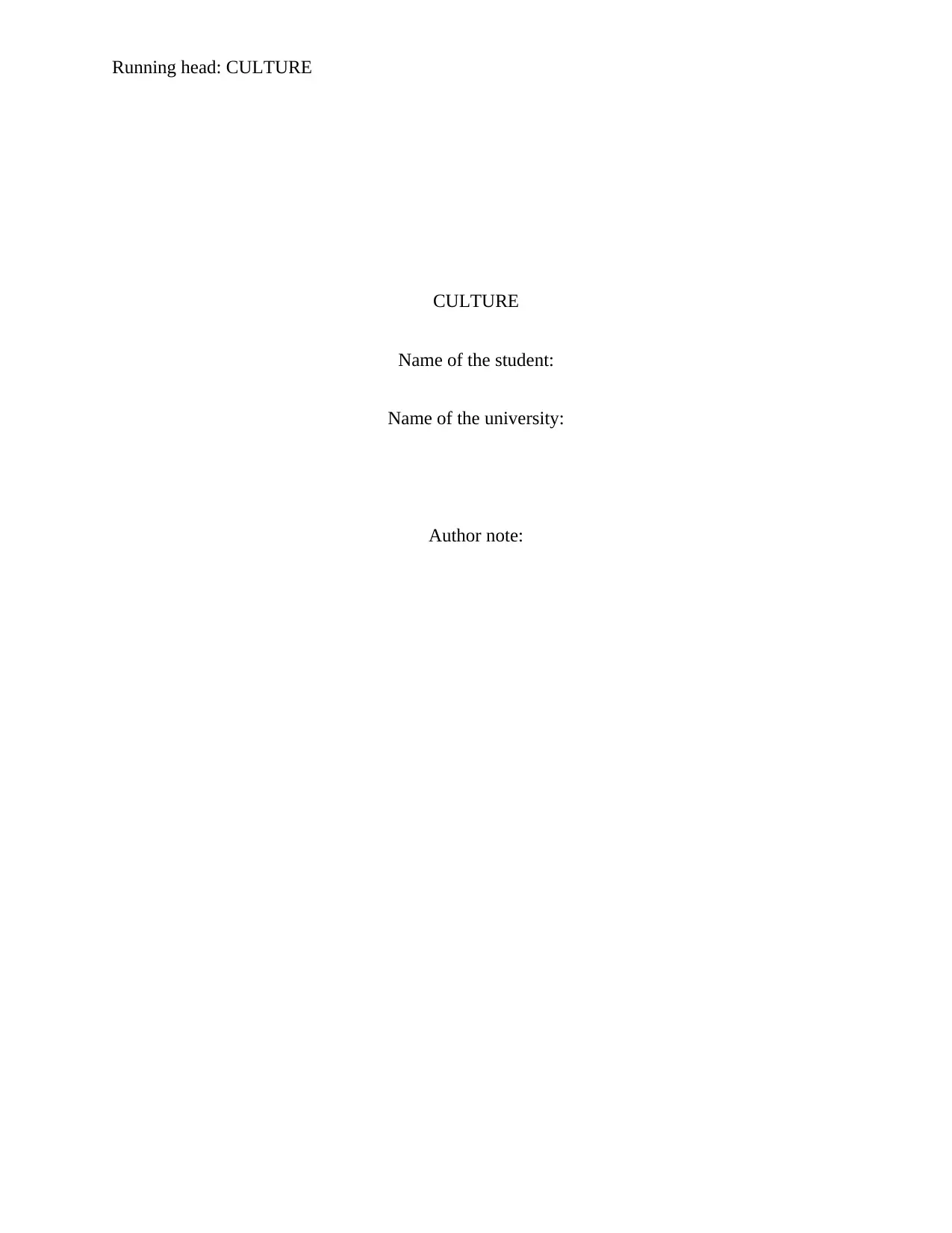
Running head: CULTURE
CULTURE
Name of the student:
Name of the university:
Author note:
CULTURE
Name of the student:
Name of the university:
Author note:
Paraphrase This Document
Need a fresh take? Get an instant paraphrase of this document with our AI Paraphraser
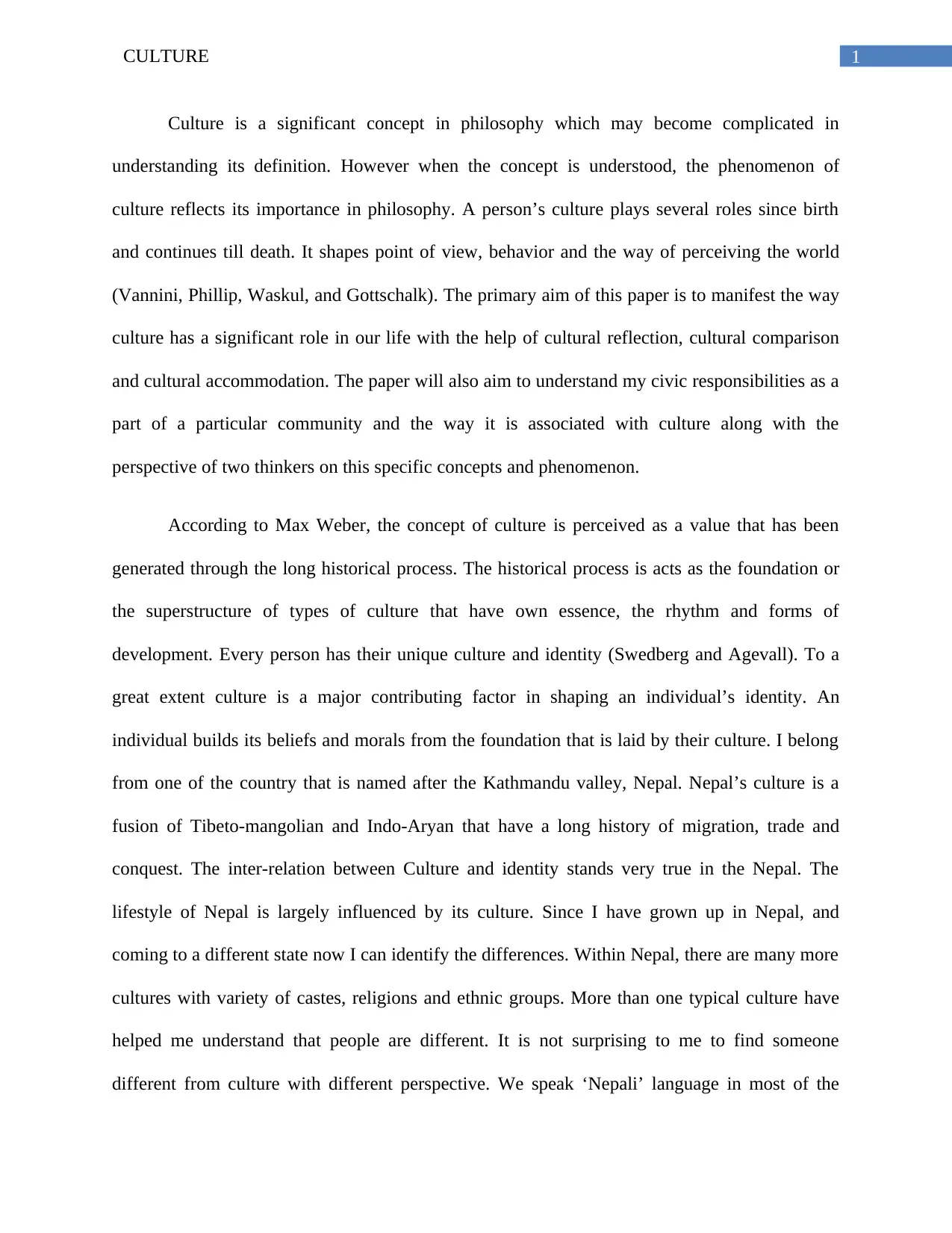
1CULTURE
Culture is a significant concept in philosophy which may become complicated in
understanding its definition. However when the concept is understood, the phenomenon of
culture reflects its importance in philosophy. A person’s culture plays several roles since birth
and continues till death. It shapes point of view, behavior and the way of perceiving the world
(Vannini, Phillip, Waskul, and Gottschalk). The primary aim of this paper is to manifest the way
culture has a significant role in our life with the help of cultural reflection, cultural comparison
and cultural accommodation. The paper will also aim to understand my civic responsibilities as a
part of a particular community and the way it is associated with culture along with the
perspective of two thinkers on this specific concepts and phenomenon.
According to Max Weber, the concept of culture is perceived as a value that has been
generated through the long historical process. The historical process is acts as the foundation or
the superstructure of types of culture that have own essence, the rhythm and forms of
development. Every person has their unique culture and identity (Swedberg and Agevall). To a
great extent culture is a major contributing factor in shaping an individual’s identity. An
individual builds its beliefs and morals from the foundation that is laid by their culture. I belong
from one of the country that is named after the Kathmandu valley, Nepal. Nepal’s culture is a
fusion of Tibeto-mangolian and Indo-Aryan that have a long history of migration, trade and
conquest. The inter-relation between Culture and identity stands very true in the Nepal. The
lifestyle of Nepal is largely influenced by its culture. Since I have grown up in Nepal, and
coming to a different state now I can identify the differences. Within Nepal, there are many more
cultures with variety of castes, religions and ethnic groups. More than one typical culture have
helped me understand that people are different. It is not surprising to me to find someone
different from culture with different perspective. We speak ‘Nepali’ language in most of the
Culture is a significant concept in philosophy which may become complicated in
understanding its definition. However when the concept is understood, the phenomenon of
culture reflects its importance in philosophy. A person’s culture plays several roles since birth
and continues till death. It shapes point of view, behavior and the way of perceiving the world
(Vannini, Phillip, Waskul, and Gottschalk). The primary aim of this paper is to manifest the way
culture has a significant role in our life with the help of cultural reflection, cultural comparison
and cultural accommodation. The paper will also aim to understand my civic responsibilities as a
part of a particular community and the way it is associated with culture along with the
perspective of two thinkers on this specific concepts and phenomenon.
According to Max Weber, the concept of culture is perceived as a value that has been
generated through the long historical process. The historical process is acts as the foundation or
the superstructure of types of culture that have own essence, the rhythm and forms of
development. Every person has their unique culture and identity (Swedberg and Agevall). To a
great extent culture is a major contributing factor in shaping an individual’s identity. An
individual builds its beliefs and morals from the foundation that is laid by their culture. I belong
from one of the country that is named after the Kathmandu valley, Nepal. Nepal’s culture is a
fusion of Tibeto-mangolian and Indo-Aryan that have a long history of migration, trade and
conquest. The inter-relation between Culture and identity stands very true in the Nepal. The
lifestyle of Nepal is largely influenced by its culture. Since I have grown up in Nepal, and
coming to a different state now I can identify the differences. Within Nepal, there are many more
cultures with variety of castes, religions and ethnic groups. More than one typical culture have
helped me understand that people are different. It is not surprising to me to find someone
different from culture with different perspective. We speak ‘Nepali’ language in most of the
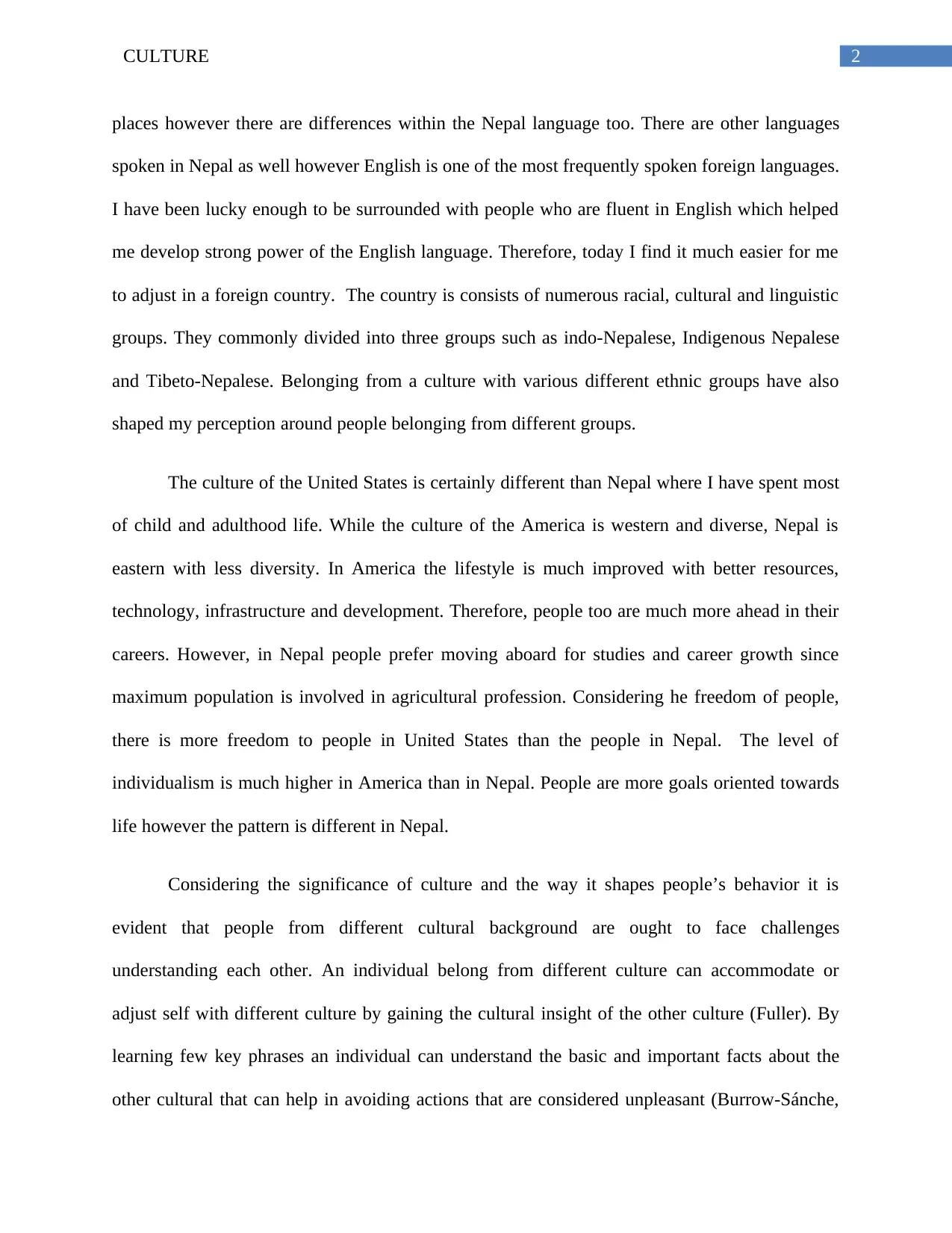
2CULTURE
places however there are differences within the Nepal language too. There are other languages
spoken in Nepal as well however English is one of the most frequently spoken foreign languages.
I have been lucky enough to be surrounded with people who are fluent in English which helped
me develop strong power of the English language. Therefore, today I find it much easier for me
to adjust in a foreign country. The country is consists of numerous racial, cultural and linguistic
groups. They commonly divided into three groups such as indo-Nepalese, Indigenous Nepalese
and Tibeto-Nepalese. Belonging from a culture with various different ethnic groups have also
shaped my perception around people belonging from different groups.
The culture of the United States is certainly different than Nepal where I have spent most
of child and adulthood life. While the culture of the America is western and diverse, Nepal is
eastern with less diversity. In America the lifestyle is much improved with better resources,
technology, infrastructure and development. Therefore, people too are much more ahead in their
careers. However, in Nepal people prefer moving aboard for studies and career growth since
maximum population is involved in agricultural profession. Considering he freedom of people,
there is more freedom to people in United States than the people in Nepal. The level of
individualism is much higher in America than in Nepal. People are more goals oriented towards
life however the pattern is different in Nepal.
Considering the significance of culture and the way it shapes people’s behavior it is
evident that people from different cultural background are ought to face challenges
understanding each other. An individual belong from different culture can accommodate or
adjust self with different culture by gaining the cultural insight of the other culture (Fuller). By
learning few key phrases an individual can understand the basic and important facts about the
other cultural that can help in avoiding actions that are considered unpleasant (Burrow-Sánche,
places however there are differences within the Nepal language too. There are other languages
spoken in Nepal as well however English is one of the most frequently spoken foreign languages.
I have been lucky enough to be surrounded with people who are fluent in English which helped
me develop strong power of the English language. Therefore, today I find it much easier for me
to adjust in a foreign country. The country is consists of numerous racial, cultural and linguistic
groups. They commonly divided into three groups such as indo-Nepalese, Indigenous Nepalese
and Tibeto-Nepalese. Belonging from a culture with various different ethnic groups have also
shaped my perception around people belonging from different groups.
The culture of the United States is certainly different than Nepal where I have spent most
of child and adulthood life. While the culture of the America is western and diverse, Nepal is
eastern with less diversity. In America the lifestyle is much improved with better resources,
technology, infrastructure and development. Therefore, people too are much more ahead in their
careers. However, in Nepal people prefer moving aboard for studies and career growth since
maximum population is involved in agricultural profession. Considering he freedom of people,
there is more freedom to people in United States than the people in Nepal. The level of
individualism is much higher in America than in Nepal. People are more goals oriented towards
life however the pattern is different in Nepal.
Considering the significance of culture and the way it shapes people’s behavior it is
evident that people from different cultural background are ought to face challenges
understanding each other. An individual belong from different culture can accommodate or
adjust self with different culture by gaining the cultural insight of the other culture (Fuller). By
learning few key phrases an individual can understand the basic and important facts about the
other cultural that can help in avoiding actions that are considered unpleasant (Burrow-Sánche,
⊘ This is a preview!⊘
Do you want full access?
Subscribe today to unlock all pages.

Trusted by 1+ million students worldwide
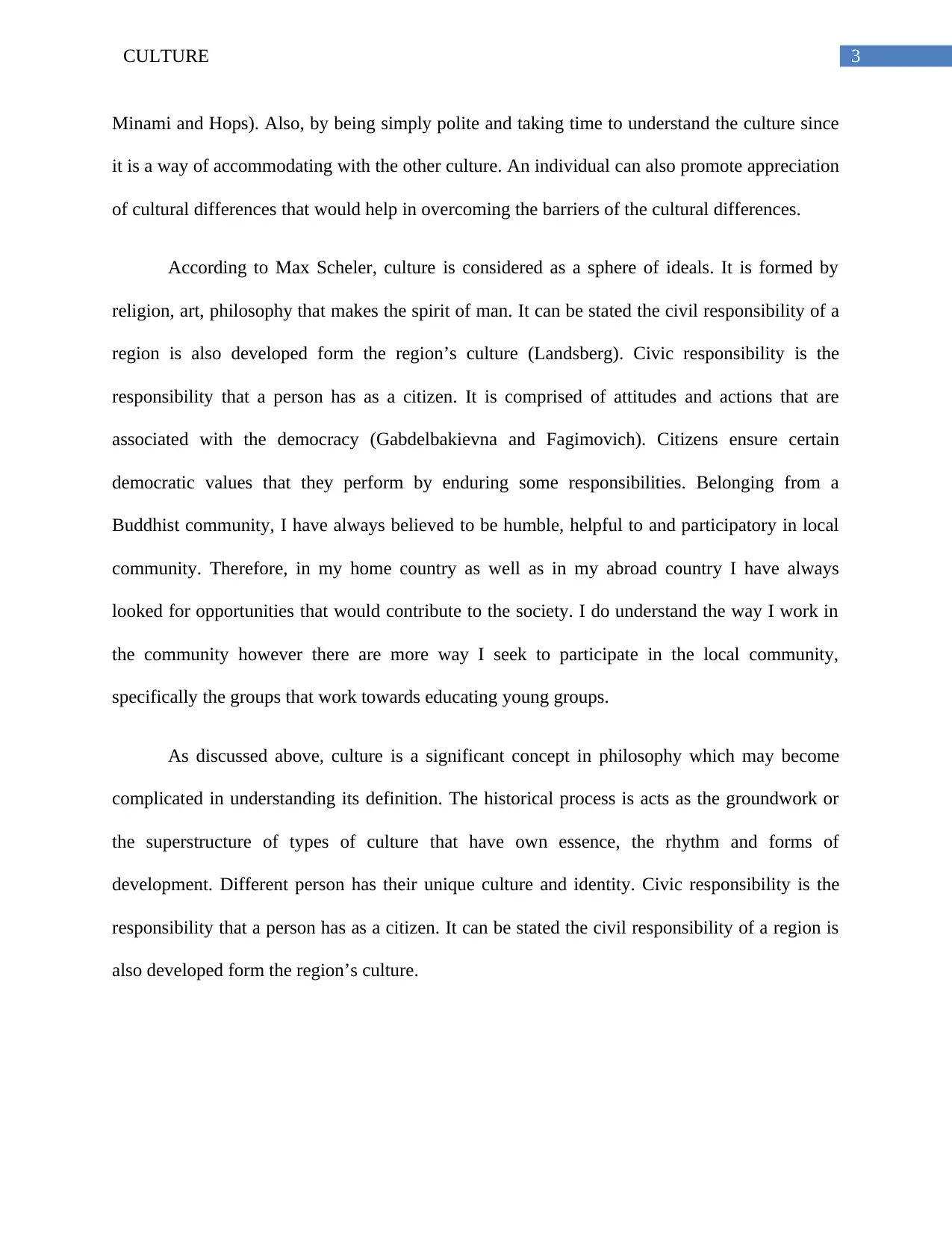
3CULTURE
Minami and Hops). Also, by being simply polite and taking time to understand the culture since
it is a way of accommodating with the other culture. An individual can also promote appreciation
of cultural differences that would help in overcoming the barriers of the cultural differences.
According to Max Scheler, culture is considered as a sphere of ideals. It is formed by
religion, art, philosophy that makes the spirit of man. It can be stated the civil responsibility of a
region is also developed form the region’s culture (Landsberg). Civic responsibility is the
responsibility that a person has as a citizen. It is comprised of attitudes and actions that are
associated with the democracy (Gabdelbakievna and Fagimovich). Citizens ensure certain
democratic values that they perform by enduring some responsibilities. Belonging from a
Buddhist community, I have always believed to be humble, helpful to and participatory in local
community. Therefore, in my home country as well as in my abroad country I have always
looked for opportunities that would contribute to the society. I do understand the way I work in
the community however there are more way I seek to participate in the local community,
specifically the groups that work towards educating young groups.
As discussed above, culture is a significant concept in philosophy which may become
complicated in understanding its definition. The historical process is acts as the groundwork or
the superstructure of types of culture that have own essence, the rhythm and forms of
development. Different person has their unique culture and identity. Civic responsibility is the
responsibility that a person has as a citizen. It can be stated the civil responsibility of a region is
also developed form the region’s culture.
Minami and Hops). Also, by being simply polite and taking time to understand the culture since
it is a way of accommodating with the other culture. An individual can also promote appreciation
of cultural differences that would help in overcoming the barriers of the cultural differences.
According to Max Scheler, culture is considered as a sphere of ideals. It is formed by
religion, art, philosophy that makes the spirit of man. It can be stated the civil responsibility of a
region is also developed form the region’s culture (Landsberg). Civic responsibility is the
responsibility that a person has as a citizen. It is comprised of attitudes and actions that are
associated with the democracy (Gabdelbakievna and Fagimovich). Citizens ensure certain
democratic values that they perform by enduring some responsibilities. Belonging from a
Buddhist community, I have always believed to be humble, helpful to and participatory in local
community. Therefore, in my home country as well as in my abroad country I have always
looked for opportunities that would contribute to the society. I do understand the way I work in
the community however there are more way I seek to participate in the local community,
specifically the groups that work towards educating young groups.
As discussed above, culture is a significant concept in philosophy which may become
complicated in understanding its definition. The historical process is acts as the groundwork or
the superstructure of types of culture that have own essence, the rhythm and forms of
development. Different person has their unique culture and identity. Civic responsibility is the
responsibility that a person has as a citizen. It can be stated the civil responsibility of a region is
also developed form the region’s culture.
Paraphrase This Document
Need a fresh take? Get an instant paraphrase of this document with our AI Paraphraser
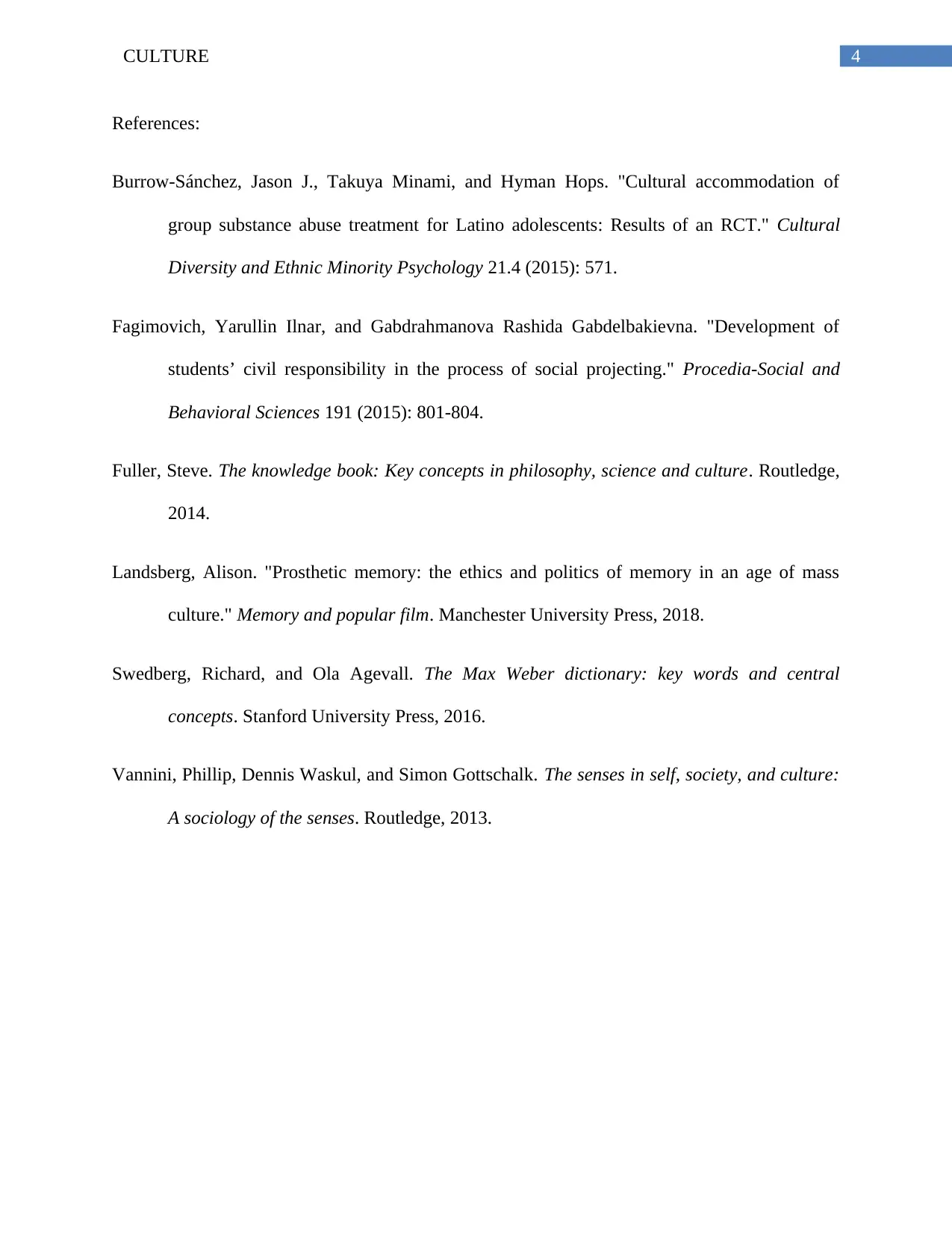
4CULTURE
References:
Burrow-Sánchez, Jason J., Takuya Minami, and Hyman Hops. "Cultural accommodation of
group substance abuse treatment for Latino adolescents: Results of an RCT." Cultural
Diversity and Ethnic Minority Psychology 21.4 (2015): 571.
Fagimovich, Yarullin Ilnar, and Gabdrahmanova Rashida Gabdelbakievna. "Development of
students’ civil responsibility in the process of social projecting." Procedia-Social and
Behavioral Sciences 191 (2015): 801-804.
Fuller, Steve. The knowledge book: Key concepts in philosophy, science and culture. Routledge,
2014.
Landsberg, Alison. "Prosthetic memory: the ethics and politics of memory in an age of mass
culture." Memory and popular film. Manchester University Press, 2018.
Swedberg, Richard, and Ola Agevall. The Max Weber dictionary: key words and central
concepts. Stanford University Press, 2016.
Vannini, Phillip, Dennis Waskul, and Simon Gottschalk. The senses in self, society, and culture:
A sociology of the senses. Routledge, 2013.
References:
Burrow-Sánchez, Jason J., Takuya Minami, and Hyman Hops. "Cultural accommodation of
group substance abuse treatment for Latino adolescents: Results of an RCT." Cultural
Diversity and Ethnic Minority Psychology 21.4 (2015): 571.
Fagimovich, Yarullin Ilnar, and Gabdrahmanova Rashida Gabdelbakievna. "Development of
students’ civil responsibility in the process of social projecting." Procedia-Social and
Behavioral Sciences 191 (2015): 801-804.
Fuller, Steve. The knowledge book: Key concepts in philosophy, science and culture. Routledge,
2014.
Landsberg, Alison. "Prosthetic memory: the ethics and politics of memory in an age of mass
culture." Memory and popular film. Manchester University Press, 2018.
Swedberg, Richard, and Ola Agevall. The Max Weber dictionary: key words and central
concepts. Stanford University Press, 2016.
Vannini, Phillip, Dennis Waskul, and Simon Gottschalk. The senses in self, society, and culture:
A sociology of the senses. Routledge, 2013.
1 out of 5
Related Documents
Your All-in-One AI-Powered Toolkit for Academic Success.
+13062052269
info@desklib.com
Available 24*7 on WhatsApp / Email
![[object Object]](/_next/static/media/star-bottom.7253800d.svg)
Unlock your academic potential
Copyright © 2020–2026 A2Z Services. All Rights Reserved. Developed and managed by ZUCOL.




